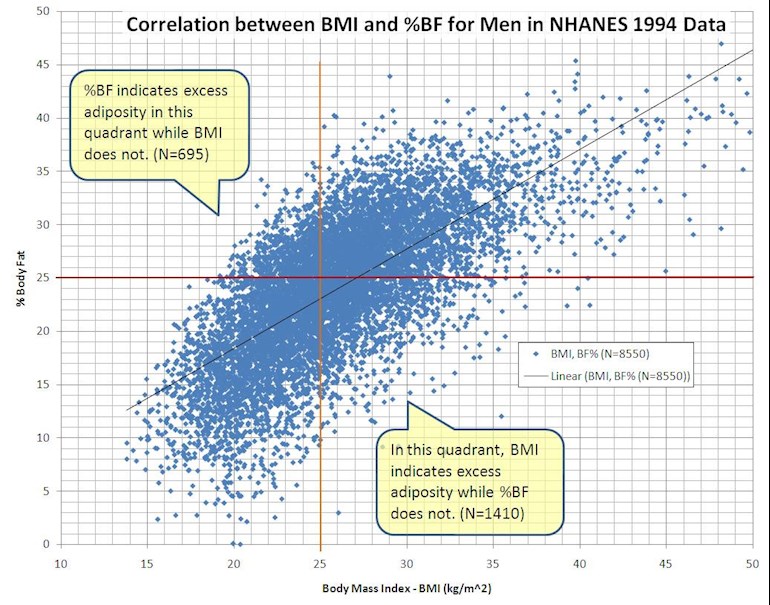Unfortunately, “obesity” no longer means “overfat” it is (thought to be) defined in terms of Body Mass Index (BMI) - You weight in Kilograms divided by the square of your height in metres. (The dictionary still says obesity is “grossly fat or overweight”.) The problem is excess fat… but your weight is what you can accurately measure, record and compare.
If you are overfat you are “carrying” extra fat. (If you are a polar bear, you need fat reserves to get you through hibernation.) If you are heavy but muscular (with a high BMI), you, hopefully, have the strength to carry the additional weight. If you have to walk up a mountain, hopefully, you also have proportional cardiovascular capacity.
How do you decide when you have the weight/body-fat percentage?
You cannot accurately measure fat (DEXA scanning is "the standard", but expensive), but weight is a guide.
As you can see in the picture at the top of this post, BMI is a very poor indicator of body fat percentage – if it was a good indicator, all the dots/plots would be in a straight line! (as they are to a much greater degree for Relative Fat Mass, see below) See BMI:
medicalnewstoday.com/articl...
This chart gives assessments for body-fat percentage for men and women of different ages:
theweekdayplan.files.wordpr...
There are many ways of determining what your body-fat percentage is, and what your ideal weight range should be, including:
Relative Fat Mass (RFM): This is a very simple and accurate system... and you only need a tape measure. See:
It tells me my body fat percentage is 21.5, or average-normal. Below is a link to graphs indicating that (RFM) is much more consistent than BMI:
nature.com/articles/s41598-...
Thank you Subtle_badger for bringing RFM to my attention.
NHS BMI: (The weight for height chart you can find on virtually every doctor or nurse surgery.) This is the simplest, but most crude and generalized estimation, but it is “OK” for “normal” people …but, some members here do not conform to the "norm", e.g. high lean (muscle) mass, tall or old.
See:
nhs.uk/Tools/Pages/Healthyw...
Smart BMI: (this give a higher healthy weight range for older people)
smartbmicalculator.com/why-...
US Navy bodyfat website: This seems better, but uses your waist measurement as input data. I had a large waist measurement due to a distended abdomen, due to gluten intolerance, so the figure may have been inaccurate, but now I am thinking about my target weight for maintenance, and it says my body-fat percentage is OK. See:
google.co.uk/search?q=u.s.+...
Belt/dress size: Being able to get into your clothes is a very good guide – I always tried to avoid buying more clothes because I could not get it what I had. If you have IBS or Gluten intolerance, you may have a distended abdomen, so waist measurement may not a very good indicator of body-fat... but if males have a waist measurement half their height, it tends to indicate that they are not over-fat, and do not have (Non-Alcoholic) Fatty-Liver Disease (NAFLD) or IBS (Irritable Bowell Syndrome).
Fat Calliper: If you want to measure fat, then measuring fat is logical: this method is so cost-effective no one goes to much trouble promoting it or selling it. There are several different websites giving formulae for multiple fat pinch-site measurements, but the single suprailliac accu-measure system is, I hear, as good as any for young people:
accumeasurefitness.com/body...
According to the BizCalcs website I an now 16% body-fat, which, for a 71-year-old male is, according to some sources, "Fit or athletic" and too lean for optimal life expectancy.
cheritorrox (thanks) looked at different websites to determine her body fat percentage, and found:
omnicalculator (28.08),
brianmac.co.uk (37.3),
gym goal (33.8 US Navy method or 29.5 according to a book Fit or Fat), and the other 2 were from bmi-calories.com with
another "US Navy method" at 26.7 this time and
BMI method at 29.1. There's another one called
verywellfit.com which came in at 28%
Most of these websites give you a suggested target weight, but you can determine your current body-fat percentage, and then look at a few of the numerous websites for the healthy range of body fat, BMI or weight for your sex, race, and age, and get an indication of how much weight you want to lose. When I had a lean mass of 95kg, the NHS BMI site gave me a target weight of 92kg! Websites give me target weights differing by almost four stones, so they cannot all be right! If you Google “BMI life expectancy” and click on “images” you will see some charts saying that up to BMI 28 gives you the best life expectancy… but at least one says that up to BMI 32 gives older people the best life expectancy.
I am 6' 3", 71 and I am 16% body-fat - and my BMI is 24.5.
